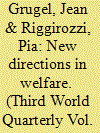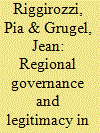|
|
|
Sort Order |
|
|
|
Items / Page
|
|
|
|
|
|
|
| Srl | Item |
| 1 |
ID:
081744


|
|
|
|
|
| Publication |
2008.
|
| Summary/Abstract |
International economic power (the ability to shape rules of global economic conduct) needs to be understood in terms of the interactions between rule-makers and rule-takers in the global economy. Attempts to reshape development paradigms through interventions during financial crisis have been highly significant for the domestic political economy of the developing world. In the 1980s and early 1990s, the primary question was how much countries would liberalize in response to financial crisis. Reactions to the crises of the late 1990s in Asia and Latin America were more varied. This article explores domestic political responses to crises in both regions in the 1980s and late 1990s. It argues that countries are finding it increasingly difficult to trump domestic political pressure for change with arguments about technocratic necessity. Popular pressure is pushing governments into new experiments in economic nationalism, not a radical rejection of global economic integration, but a reshaping of relationships in an attempt to secure national interests and, in some cases, to devote more resources to welfare. Experiments to date are modest, but could presage more significant change in the future
|
|
|
|
|
|
|
|
|
|
|
|
|
|
|
|
| 2 |
ID:
158919


|
|
|
|
|
| Summary/Abstract |
What happens to the politics of welfare in the Global South when neoliberal values are questioned? How is welfare re-imagined and re-enacted when governments seek to introduce progressive change? Latin America provides an illustration and a valuable entry point to debates about ‘interruptions’ of neoliberalism and the changing nature of social policy. Drawing on examples of disability policies in Ecuador and care provision in Uruguay, we argue that there is a ‘rights turn’ in welfare provision under the left that reflects a recognition that previous welfare models left too many people out, ethically and politically, as well as efforts to embed welfare more centrally in new patterns of respect for socio-economic and identity-based human rights. Given Latin America’s recent contestation of neoliberal development as well as its history of sometimes dramatic welfare shifts, the emergence of rights-based social provision is significant not just for the region but also in relation to global struggles for more equitable governance.
|
|
|
|
|
|
|
|
|
|
|
|
|
|
|
|
| 3 |
ID:
140270


|
|
|
|
|
| Summary/Abstract |
Over the last decade, rapid changes to development models and market rules have led—yet again—to a revision of the meaning of regionalism, bringing to the fore the role of regional organizations in anchoring democracy and supporting progressive social policies. This is particularly the case in South America, where the presence of regional organizations in public policy-making is a subject of increasing scrutiny. This article examines new forms of politically sensitive regional governance in South America, focusing in particular on the case of the Union of South American Nations (UNASUR). It shows how contemporary South American regionalism bypasses the questions of trade and investment that dominated earlier schemes of regionalism in order to focus on shoring up democracy and managing the regional social deficit. The article explores UNASUR's actions in two policy areas: supporting the regional democratic norm and health policy. UNASUR, this article argues, is developing a hybrid form of output-focused legitimacy that rests on a combination of credible commitments to welfare promotion, especially for the poor, and the pursuit of collective public goods, alongside a robust defence of quite minimal but uncontroversial standards of procedural democracy across the region. The analysis challenges the view that regionalism has failed in South America and identifies instead the emergence of a new sort of highly political regionalism. We call for UNASUR to be taken more seriously in the literature on comparative regionalism and, indeed, for a revision of how regionalism more widely is understood in Latin America.
|
|
|
|
|
|
|
|
|
|
|
|
|
|
|
|
| 4 |
ID:
139584


|
|
|
|
|
| Summary/Abstract |
Tackling germs, negotiating norms, and securing access to medicines are persistent challenges that disproportionally affect developing countries' participation in global health governance. Furthermore, over the last two decades, the excessive focus on global pandemics and security in global health diplomacy, rendered peripheral diseases that usually strike the poor and vulnerable, creating situations of marginalisation and inequality across societies. However, as the importance of regions and regionalism increases in global politics, and integration ambitions and initiatives extend beyond trade and investment to embrace welfare policy, there are new opportunities to explore whether and how regional commitments affect health equity and access to medicine in developing nations. What, if any, are the possibilities for meso-level institutions to provide leadership and direction in support of alternative practices of global (health) governance? Can regional polities become international advocacy actors in support of global justice goals? This article addresses these questions by analysing regional health diplomacy in South America. The article argues that regional organisations can become sites for collective action and pivotal actors in the advocacy of rights (to health) enabling diplomatic and strategic options to member state and nonstate actors, and playing a role as deal-broker in international organisations by engaging in new forms of regional health diplomacy.
|
|
|
|
|
|
|
|
|
|
|
|
|
|
|
|
|
|
|
|
|